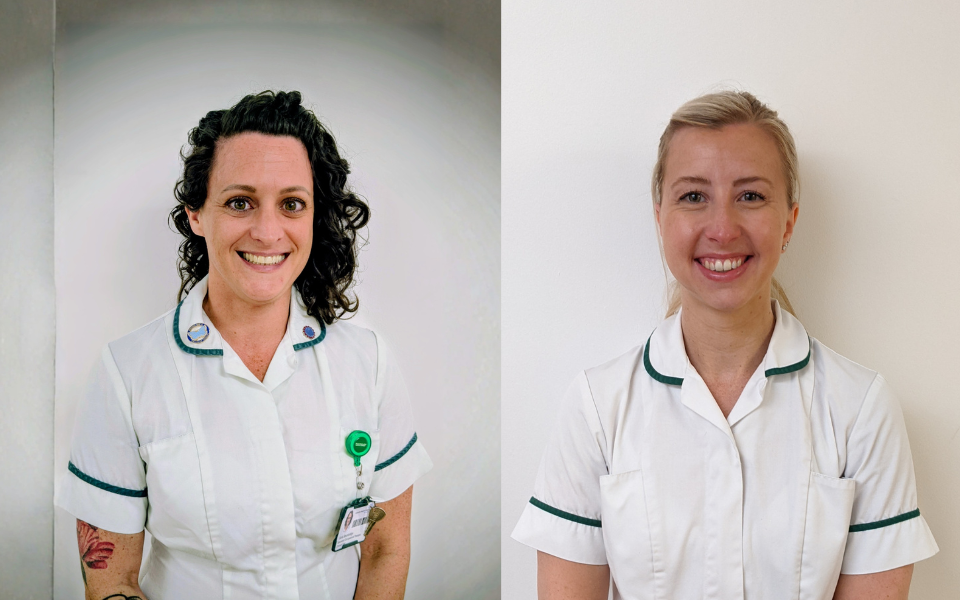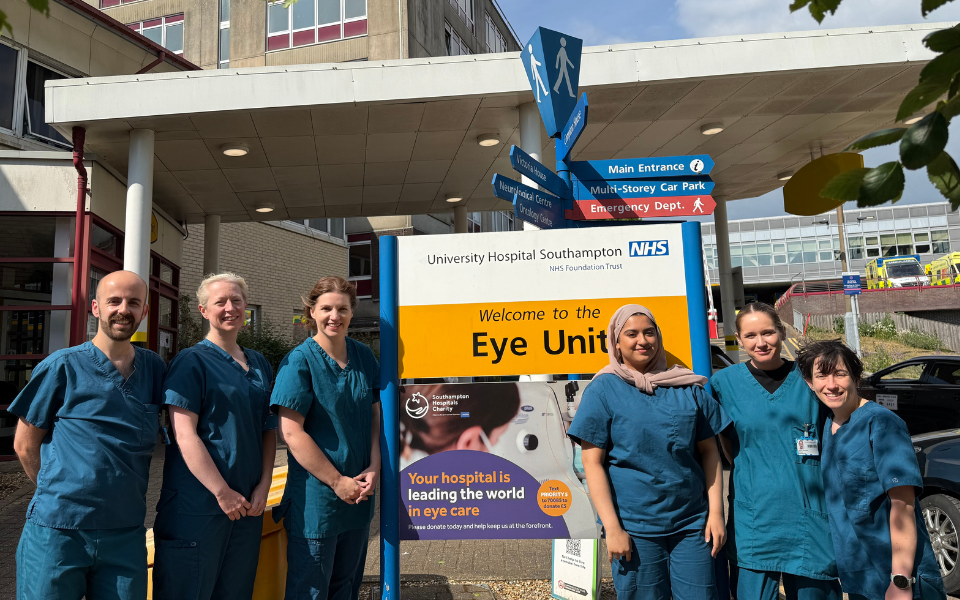
Allied health | Career Development and Education
Shaping Vision, Changing Lives: Orthoptics at UHS
Ever wondered what our Orthoptic team do? Or perhaps you’ve never even heard of this role before?
At University Hospital Southampton (UHS), we’re proud to have a diverse range of roles that contribute to patient care, and Orthoptics is one of them. As part of the Allied Health Professions (AHPs), Orthoptists play a crucial part in diagnosing and managing a wide range of visual disorders in both adults and children.
In this blog, you’ll hear from some of our Orthoptists (Photo from left to right is: Tomos, Megan, Helen, Safa, Jessica and Hedydd) as they share what led them into this career, what a typical day looks like, how their work makes a difference to patients, and the opportunities they’ve had for growth in research, teaching, and leadership. Whether you're curious about the profession or considering a healthcare career yourself, their stories offer a valuable insight into an incredibly impactful role in the NHS.
What inspired you to pursue a career in Orthoptics, and how did you get started?
Tomos, Senior Orthoptist and Stroke Lead: I wanted to work in a healthcare setting, and after working as an optical assistant in the private sector, I decided that Orthoptics and working in the NHS was the right choice for me.
Jessica, Orthoptist: I underwent laser eye surgery, which sparked an interest in the eye. I was initially looking to study optometry and came across orthoptics whilst applying. It wasn’t something I had ever heard of, so I did some shadowing of both the Orthoptists and Optometrists at UHS, and Orthoptics seemed like a better fit!
Safa, Orthoptist: I started off looking at jobs that involved direct patient care and did a lot of volunteering at an NHS hospital and a private clinic. I liked the direct communication and interaction with patients and wanted to be involved in the care of both paediatrics and adults. I did some research on different AHP roles, did some shadowing, and I found that Orthoptics was one of the roles that I enjoyed.
Hedydd, Senior Orthoptist and Teaching Lead: I have always had an interest in healthcare and knew that I wanted to be involved in the medical world. I developed an interest in eyes and went on work experience at a high street optician, but did not feel this was the correct path for me.
After some research, I found orthoptics and felt this was the best of both worlds as we work in a medical environment, diagnosing and managing eye conditions, whilst also having the satisfaction of working within the NHS. I studied sciences at A-level and went on to study ‘Orthoptics’ for three years at The University of Liverpool.
Helen, Senior Orthoptist and Deputy Stroke Lead: I wanted a job that involved helping others. I went to visit a department close to home and felt that this would be something I enjoyed doing.
Megan, Deputy Head Orthoptist and Research Orthoptist: I always wanted to work in healthcare. Studying eyes at school and having an eye problem myself inspired me to look into Orthoptics. I went for work experience in my local Orthoptic department and really enjoyed it.
What does a typical day in your Orthoptic role look like?
Tomos, Senior Orthoptist and Stroke Lead: My role as the stroke lead orthoptist is very varied. Most mornings, I am working alongside other members of the stroke team on the hyper-acute and acute stroke units, assessing vision problems following stroke.
Afternoons are based in outpatients seeing adults with complex eye movement problems, visual field loss and visual perception problems. I also work in paediatric orthoptic clinics.
Jessica, Orthoptist: The day starts with a team meeting before morning clinics. These can be paediatric or adult clinics; orthoptic only, or paired with consultants’ clinics, which can range from ocular motility, neuro-ophthalmology, nystagmus and more. After lunch, we will have our afternoon clinics.
Safa, Orthoptist: A ‘typical day’ usually involves assessing paediatric and/or adult patients. This varies depending on whether the clinic is Orthoptist-led, so looking at conditions where the eyes do not work together, or if it is consultant-led and more specialised ophthalmology or patients who are keen on surgery for squints.
Hedydd, Senior Orthoptist and Teaching Lead: A typical day consists of two clinical sessions: one in the morning and one in the afternoon, including a varied case load of children and adults. As orthoptists, we work autonomously, meaning we diagnose and manage our patients, but we often work closely with optometrists and ophthalmologists as required.
This means that some clinics will consist of patients who are seeing the orthoptist only, and other clinics will be joint clinics with optometrists/ophthalmologists. Over the last year, I have been covering maternity leave for the ‘Teaching Lead’ role, which has meant that I have been arranging clinical placements for orthoptic students who attend the hospital as a placement site.
This has created a lot of variety within the role, liaising with universities and ensuring orthoptic students have the best possible experience while working with our team. I also arrange teaching afternoons for orthoptists and encourage education within the department.
Helen, Senior Orthoptist and Deputy Stroke Lead: I really enjoy my current role as it includes such a varied caseload. I see both a mixture of adult and paediatric patients in the eye outpatients but also get to work with adults on the stroke wards. Whilst a lot of my work takes place at the main site in Southampton, I also get to travel out and so community clinics.
Megan, Deputy Head Orthoptist and Research Orthoptist: I have quite a varied role. My week is split into clinical time where I see adults and children for Orthoptic follow-ups and in specialists’ clinics. I also have managerial time where my colleagues and I discuss and implement changes within our department to improve our service, and I also oversee the operational running of the department. I am also a Research Orthoptist, and I am involved in supporting and setting up studies in Paediatric Ophthalmology.
How do you see the impact of your role in improving patient outcomes?
Tomos, Senior Orthoptist and Stroke Lead: The orthoptist's involvement in the stroke team has allowed better education of visual deficits following stroke for both patients and their families. Awareness of vision problems in adults and management of these problems helps with fall prevention and improves quality of life.
Jessica, Orthoptist: Orthoptists help to treat a variety of patients. Be it helping with symptoms of double vision, conducting measurements for squint surgery, or improving vision with glasses or patching, helping patients is always rewarding.
Hedydd, Senior Orthoptist and Teaching Lead: As orthoptists, we specialise in the visual development of children; treating and managing visual problems at an early age can have a positive lifelong impact on the child’s future, resulting in better quality of life.
We also help manage symptoms of double vision (diplopia) in adults and make sure that any concerns are escalated within the ophthalmology team, ensuring patients are investigated and managed appropriately.
As a placement site, we aim to give orthoptic students the best possible experience, helping to train and retain orthoptists within the profession, leading to better patient care in the future.
Helen, Senior Orthoptist and Deputy Stroke Lead: Seeing a child have improvement in their vision after undergoing patching treatment always makes me smile. This can often be hard work for children and their families, so it is always nice to see a positive result. Patients who suffer from double vision and are given a prism to help relieve this symptom are often hugely grateful, and this can have a big impact on their day-to-day life.
Have you been involved in research, teaching, or leadership roles within orthoptics? How did you get started?
Tomos, Senior Orthoptist and Stroke lead: I have just completed a distance learning master's course involving some research into stroke patients' reading ability and quality of life. I was very fortunate enough to have a funded place for this master's course. My current role involves leading the stroke orthoptic service and providing training and support to other orthoptists and team members within the service.
Safa, Orthoptist: Yes, there are many opportunities for research projects, and I have been involved in clinical audits and research. I would recommend inquiring earlier on if you are interested in taking part in research - many clinicians and consultants are heavily involved in new areas of research and are usually very happy to have interest!
Teaching is a large part of the job role. Working in a tertiary centre and a teaching hospital, we have students regularly, and this can be Orthoptic students who are regularly on placement and perform examinations under supervision, or nursing and medical students who observe the clinics.
Hedydd, Senior Orthoptist and Teaching Lead: I have participated very lightly in research by helping with practical elements such as recruiting patients I have seen or testing the vision of those participating, but our Research Orthoptist, Jeremy, along with our Deputy Head Orthoptist, Megan, lead on research within our department.
I have been much more heavily involved in teaching as the ‘Deputy Teaching Lead’ and now the ‘Teaching Lead’ while seconded, covering maternity leave. I arrange the orthoptic placements for students who attend the department as a part of their university degree, but I have also been involved in the teaching of medical students attending our Ophthalmology placement.
I have been involved in arranging teaching days for trainee ophthalmologists and am currently undertaking a ‘Clinical Education Internship’ at Solent University, Southampton, experiencing first-hand how students are taught and assessed at a university level. I will be starting a ‘PgCert in Practice Education’ in September this year. I have been fortunate enough to attend courses on leadership, and I hope this is something that I will be continuously developing throughout my career. I would like to think that I have shown leadership within my role as the ‘Teaching Lead’ and as a deputy to this role, and have shown leadership within the team and with our students.
Megan, Deputy Head Orthoptist and Research Orthoptist: I have been a research Orthoptist for many years, where I have been part of designing and setting up research projects. I have also been studying sites for multicentre studies and have been involved in writing papers. I have also been Deputy Head Orthoptist of my department for nine years.
What opportunities have you had for growth or specialisation as an Orthoptist?
Tomos, Senior Orthoptist and Stroke lead: Over my 7 years at UHS, I have been involved in complex adult and paediatric orthoptic clinics, including paediatric cataract, nystagmus and genetics. I have trained and worked within the medical retina service and delivered eye injections to patients with macular degeneration. Over the last 3 years, I have developed and led the orthoptic stroke service at UHS.
Jessica, Orthoptist: Since graduating, I have constantly been learning from experienced colleagues and through cases that I’ve seen. I’ve attended teaching, conferences, and courses at UHS and in London and Birmingham. I’m relatively newly qualified, so I look forward to further specialisation with time.
Safa, Orthoptist: There are always opportunities for growth and extended roles in Orthoptics, but this does vary depending on the department and hospital. Shadowing other Orthoptists with extended roles is helpful in knowing what you may be interested in.
Hedydd, Senior Orthoptist and Teaching Lead: Over my career, I have been working in clinics consisting of complex paediatric and adult cases, always learning from different cases. I was given the opportunity to further study and obtain a qualification in glaucoma.
I am also currently undertaking a ‘Clinical Education Internship’ at Solent University to have first-hand experience of working in higher education and will be starting a ‘PgCert in Practice Education’ in September this year. I have been seconded for the last year to cover the ‘Teaching Lead’ maternity leave, and this has given me the chance to grow as an individual as well as an orthoptist, taking on a lot of new responsibilities.
Megan, Deputy Head Orthoptist and Research Orthoptist: I started working at UHS 15 years ago as a band 6 Orthoptist, where I gained experience in a wide range of Orthoptic specialities. I then went on to be the department's first Research Orthoptist and developed the role. I also have experience in intravitreal injecting, and I am now Deputy Head Orthoptist.
How does collaboration with colleagues enhance your role as an Orthoptist?
Tomos, Senior Orthoptist and Stroke Lead: Working with a dedicated group of orthoptists, optometrists, and ophthalmologists, as well as a dedicated support service within the Eye Unit, enables the best possible experience for our patients and their families.
Jessica, Orthoptist: As orthoptists, we work alongside nurses, AHPs, and consultants from a range of specialities. Collaborating allows us to each use our specialised knowledge and skills to give the best patient care.
Hedydd, Senior Orthoptist and Teaching Lead: Teamwork is the key to ensuring a positive outcome for patients. We work together closely as orthoptists, always supporting each other, and this is why our department works so well.
We collaborate with our ophthalmologists, optometrists, eye casualty and the eye unit team to ensure that patient care is appropriate and effective, giving them the best possible experience.
What advice would you like to share with future Orthoptists?
Tomos, Senior Orthoptist and Stroke Lead: The work that you do is really important for our patients, their families, and the multidisciplinary teams across the hospital. Being an Orthoptist enables you to diagnose and manage a range of eye problems, and you can apply and develop your skills across other areas of ophthalmology and advanced clinic practice.
Jessica, Orthoptist: Orthoptics is a great career choice. Though I’m relatively newly qualified, I feel like I’ve made a good choice. The variety in clinics and cases keeps the role interesting, and there are many opportunities for further learning and extended roles.
Hedydd, Senior Orthoptist and Teaching Lead: I would advise you to work hard and never forget your values as an individual and as an orthoptist. We are an essential part of each patient’s journey and experience, and we improve the quality of life of hundreds of patients throughout our careers.
Take all opportunities that come your way and never shy away from a challenge or a chance to grow.
Megan, Deputy Head Orthoptist and Research Orthoptist: The work that healthcare workers do makes a difference to everyone and being an Orthoptist is very rewarding. The role of an Orthoptist has expanded massively over the last few years, so there are plenty of opportunities to develop your skills. For further experience and information, contact your local departments for work experience and universities about courses.
As you can see, our Orthoptic team at UHS come from a variety of backgrounds, but what unites them is a shared commitment to patient care and continuous development. From managing complex eye conditions to contributing to research and teaching the next generation of professionals, Orthoptists at UHS have the chance to thrive in a dynamic and supportive environment.
Orthoptics is a unique and rewarding career that combines clinical skill with meaningful patient interaction and plays an essential role in improving lives every day. If this has sparked your curiosity or if you’d like to learn more about the diverse range of healthcare careers at UHS, we’d love for you to click here to explore our careers website and discover where your path could lead.
Related Blogs
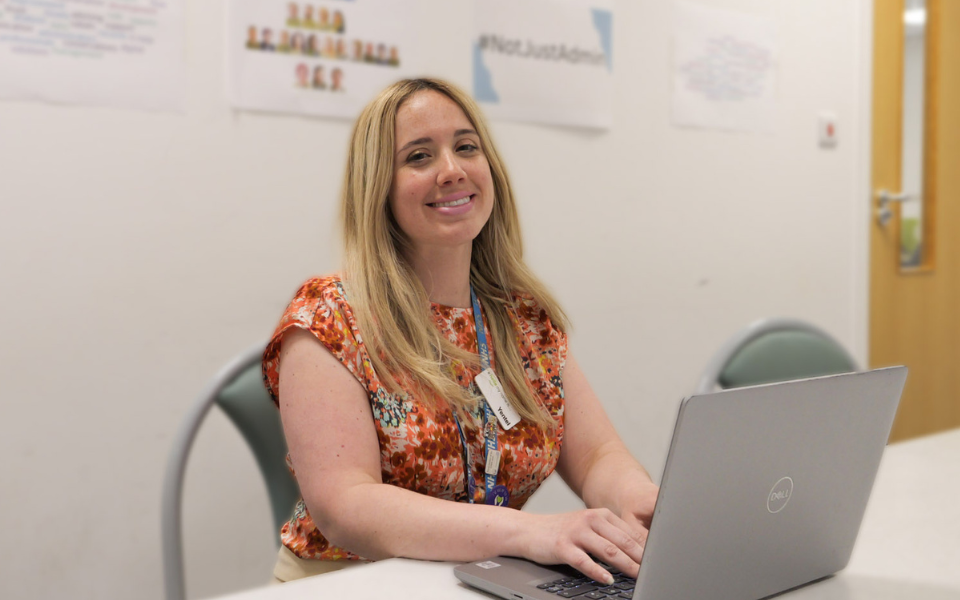
From Sports Coach to NHS Innovator: How Yentel Found Purpose at UHS
More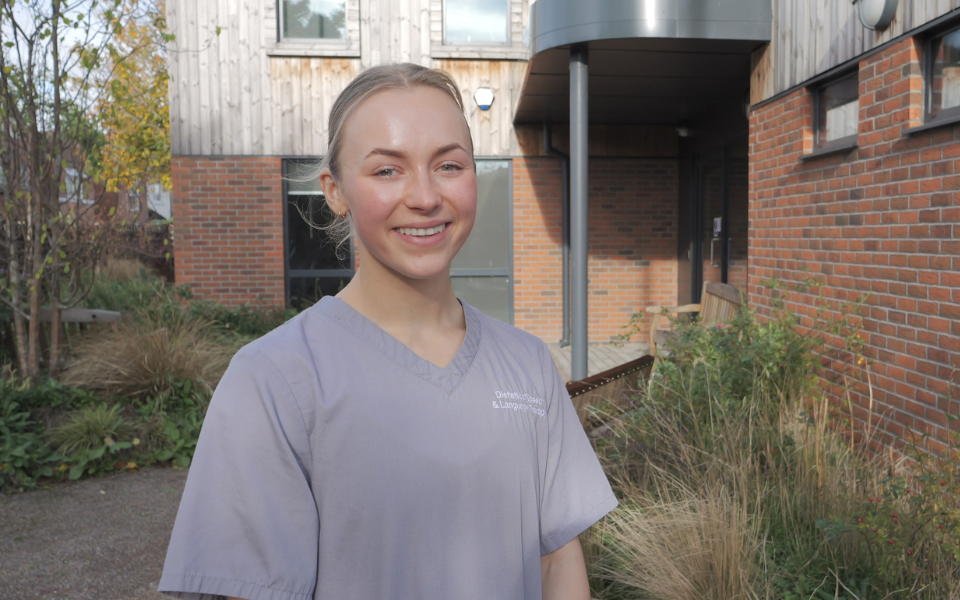
Supporting Newly Qualified Professionals: The Impact of Preceptorship at UHS – Goda’s Story
More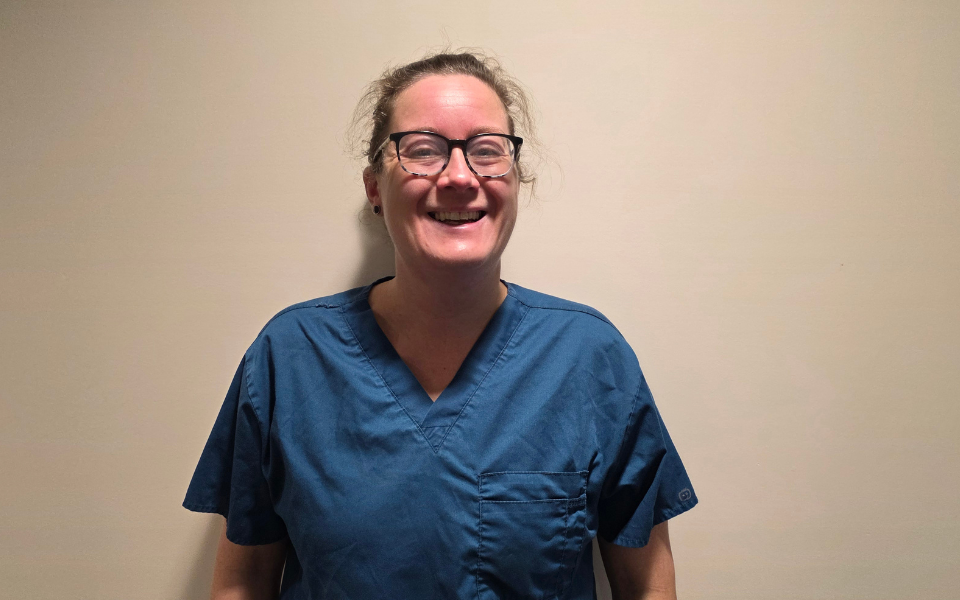
From Childhood Dream to NHS Specialist: Lizzi’s Journey in Pharmacy
More